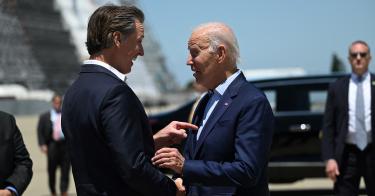Congress is moving forward with legislation to prevent California from canceling gas-powered cars and trucks. On Sept. 14, the House of Representatives passed H.R. 1435, the Preserving Choice in Vehicle Purchases Act, which would prevent the EPA from authorizing California’s climate regulators to limit the sale or use of new motor vehicles with internal combustion engines.
The legislation, authored by Rep. John Joyce (R-Pa.), would also require the EPA to revoke any such authorizations previously granted by the Biden administration. The bill now moves to the Senate for consideration.
This is big news. With the stated aim of reaching 100 percent electric for new cars, SUVs, and pickups by 2035, the California Air Resources Board, in close coordination with the Biden administration, is attempting to coerce the auto industry to transition to battery-electric vehicles faster and more broadly than market demand could ever support.
CARB is only able to advance its agenda because the Biden EPA has reinstated special waivers from federal preemption under the Clean Air Act, which the Trump administration had previously and wisely revoked.
>>> California Transportation Policy Is Not for the Free
Such waivers, which are available exclusively to California, are supposed to be granted only when necessary “to meet compelling and extraordinary conditions” involving local air quality. CARB’s climate rules obviously fail to satisfy this requirement. They were issued in pursuit of Gov. Gavin Newsom’s (D) global climate agenda, not in response to local environmental problems unique to California.
The coercive influence of CARB’s rules is compounded by the Clean Air Act’s allowance for other states to adopt California’s regulations as their own. More than a dozen blue states have already done so, which means that auto makers now face an economic imperative to engineer their national fleets to meet CARB’s demands, with terrible implications for American families in every market in the country.
These regulatory requirements will increase the cost of all new cars and trucks, eliminate the internal combustion models that are most popular, and cause highway deaths and injuries to jump as more people find themselves stuck driving older and less-safe vehicles. They will also destroy hundreds of thousands of jobs in the U.S. auto sector, degrade air quality as the U.S. auto fleet ages, and put an enormous strain on our national electricity grid. Finally, CARB’s rules will make the U.S. ever-more dependent on China for critical inputs.
These are harms that Congress intended to avoid when, in accordance with the Interstate Commerce Clause of the Constitution, it mandated uniform national standards for new motor vehicles and preempted states from enforcing different requirements of their own.
Yes, federalism allows states to experiment with innovative policies within their own jurisdictions. But the advantages of federalism are erased when one state can sweep aside the policy judgments of Congress and dictate the market choices available to consumers across the nation, as California’s climate regulations are attempting to do.
CARB’s climate rules are already ineffective. They aren’t expected to have any discernible dampening effect on global warming. In fact, they will likely lead China to expand its carbon-intense coal-fired power generation even further, because the additional energy will be needed to process all the additional minerals required to manufacture millions of electric vehicle batteries for the U.S. market.
>>> Now Biden Wants to Deny Your Consumer’s Choice in Water Heaters
The EPA’s decision to reinstate these waivers has been challenged in court by several states and industry groups, and the case was argued in the U.S. Court of Appeals for the D.C. Circuit on Sept. 15.
Whether or not the challengers prevail in court, there remains a clear need for Congress to step in and permanently end California’s climate imperialism. Courts can resolve discrete legal questions in the context of particular cases, but only Congress can establish consistent and reasonable regulatory policies for the entire nation. H.R. 1435 would do so by removing California from the driver’s seat in its radical push to end gas-powered transportation.
Likewise, the law would compel federal regulators to be more honest about the actual costs of their auto regulations. To date, the Biden EPA and Department of Transportation have conveniently excluded the costs of compliance with CARB’s rules when calculating the economic burden of their own proposed electric vehicle policies. In this way, they are manipulatively understating the costs of Biden’s rules by 30 to 40 percent or more.
The truth is, CARB’s climate regulations for new vehicles are integrally related to the Biden policies. The costs imposed on American citizens by CARB will be inseparable from the Biden administration’s own anti-fossil fuel regulatory policies.
But even if the Biden administration’s heavy-handed attempts to kill off gas-powered cars and trucks did not impose such enormous costs, they’d still be deeply unpopular. Despite the climate lobby’s best efforts, an overwhelming majority of Americans remain happy with their internal-combustion-engine vehicles and the freedom they make possible.
In passing H.R. 1435, Congress can reaffirm that freedom and prove that the people, not executive-branch bureaucrats or California climate activists, still rule in Washington.
This piece originally appeared in The Hill on September 18, 2023



